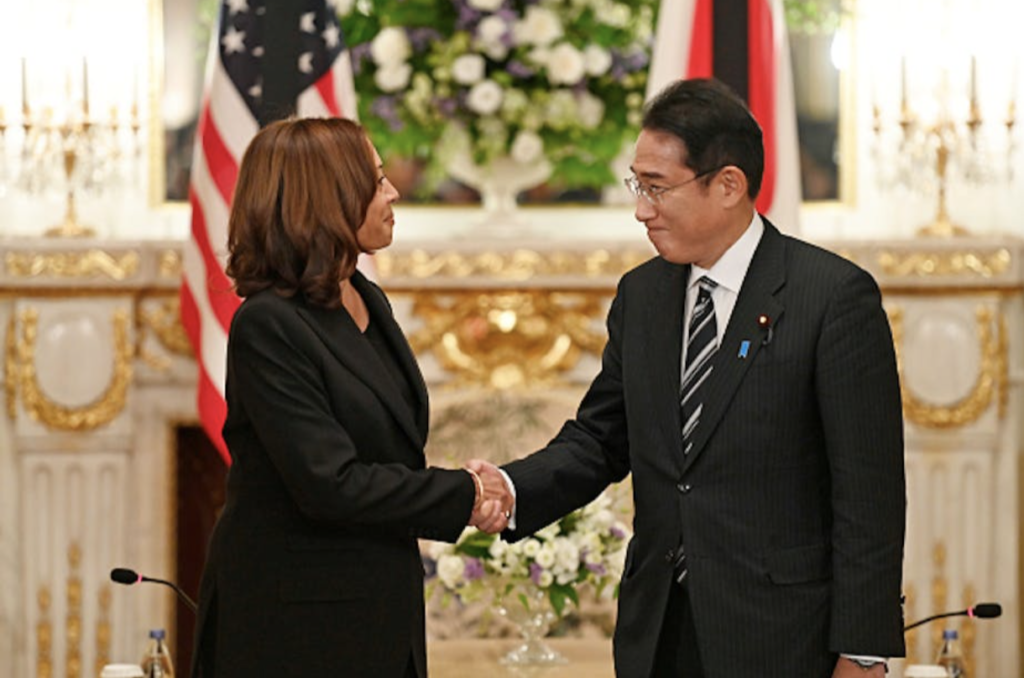AFRICA INC.
– Rising economies, start-ups, and Black wealth, etc.

Japan’s Prime Minister Fumio Kishida greets US Vice President Kamala in Tokyo. Washington is focused on moving close to partners it can trust. Photo by David Mareuil/Pool/Getty Images
Over the past few years, the world’s supply chains have been strained and disrupted by the COVID pandemic, Russia’s invasion of Ukraine, and rising geopolitical tensions. These started with the US-China trade war and then intensified following the war in Ukraine.
In response to the cumulative economic and security fallout that has ensued, some advanced countries are now ramping up efforts to divert their supply chains away from countries that are not like-minded and that do not have shared common values.
This new supply chain strategy is called “friend-shoring.” Advanced countries are creating friend-shoring alliances which are, in turn, reshaping our global economy.
These shifts have adverse implications for Africa. The approaches to reconfiguring supply chains currently unfolding threaten to heap more stress on a continent already weighed down by multiple crises.
Africa stands to lose out because the current reshaping of supply chains is not intended to shift trade, investments and jobs towards African trade partners. Rather it has to do with efforts by the EU and US to insulate their supply chains from being disrupted for geopolitical reasons by less trusted partners with significant global market share in key raw materials, commodities and other essential products.
Steps can be taken to mitigate the negative economic effects that will be imposed on Africa by this supply chain reorientation. These include forging strong and effective friend -shoring alliances with the advanced economies and defending the rules-based multilateral trading system.
The Biden administration also unveiled a new US strategy towards Sub-Saharan Africa in August. But, in sharp contrast to the Indo-Pacific Economic Framework, it does not include any specific and concrete friend-shoring commitments for African countries. And appears mainly to be another counter play against China and Russia—the US’s two top adversaries.
The push to diversify supply chains is also underway in Europe. According to European Central Bank President Christine Lagarde, nearly half of companies had diversified their supplier base by the end of 2021. As the world’s largest single market, the EU is able to use its strong regional base to diversify supply chains within the bloc.
While the COVID pandemic certainly played an important role in spurring the shift from dependence to diversification, the war in Ukraine was a tipping point for Europe from an economic and security standpoint. It further intensified the drive to diversify supply lines away from Russian suppliers of critical commodities, especially energy, food, and fertilizer. The strategy is to friend-shore them to countries deemed reliable and with shared strategic interests.
Africa stands to lose out
Africa has nothing to gain from the current reshaping of supply chains. This is because US and EU friend-shoring initiatives heavily favor Asian and Indo-pacific partners. Winners from these initiatives include Indonesia, Malaysia, Vietnam and other Indo-Pacific countries deemed to be trustworthy. Their economies will benefit from the boost given to trade, production plants, jobs and investments.
In addition, friend-shoring also threatens to undermine the World Trade Organization’s Aid for Trade initiative. This was launched in 2005 to assist developing countries reduce trade costs and thereby enhance export competitiveness. Its significance has steadily increased in the years after it was launched. At this year’s WTO meeting in July, Aid for Trade discussions focused on helping Africa and other developing countries recover and build long-term sustainable development by supporting priority needs they had identified.
These needs include trade facilitation, digital connectivity, export diversification, connecting to value chains, and women’s economic empowerment. They also focused on how environmentally sustainable development can contribute to achieving these priority needs.
Reconfiguring supply chains in ways that exclusively lend a helping hand to current US and EU maneuvering will only make it more difficult for Africa to benefit from WTO support in these important areas.
What is to be done?
Looking forward, there are at least three essential things that can be done to mitigate negative impacts on Africa.
First, effective friend-shoring alliances should be included as a centerpiece of the new US strategy towards sub-Saharan Africa. African policy makers should strongly urge the Biden administration to do this and demonstrate commitment on their part to be trusted partners.
Second, the EU should also develop an effective friend-shoring strategy with African partners, even as it pushes for an expansion of intra-bloc supply chains. Again, it is paramount that African policy makers take the lead and justify the importance of entering into a strong friend -shoring relationship with the EU.
Finally, defending the rules-based multilateral trading system is important to ensure that it continues to deliver benefits for developing and least developed countries, including those in Africa.
Launching our new NBA App and digital platform is a major milestone as we continue to build and strengthen our direct-to-consumer offerings,” said Chris Benyarko, NBA Executive Vice President, Direct-to-Consumer. “We are thrilled to deliver a reimagined product that will enhance and personalize the way NBA fans engage with the league on a daily basis.”
Your comments, ideas, and thoughts matter.
Drop us a line:
